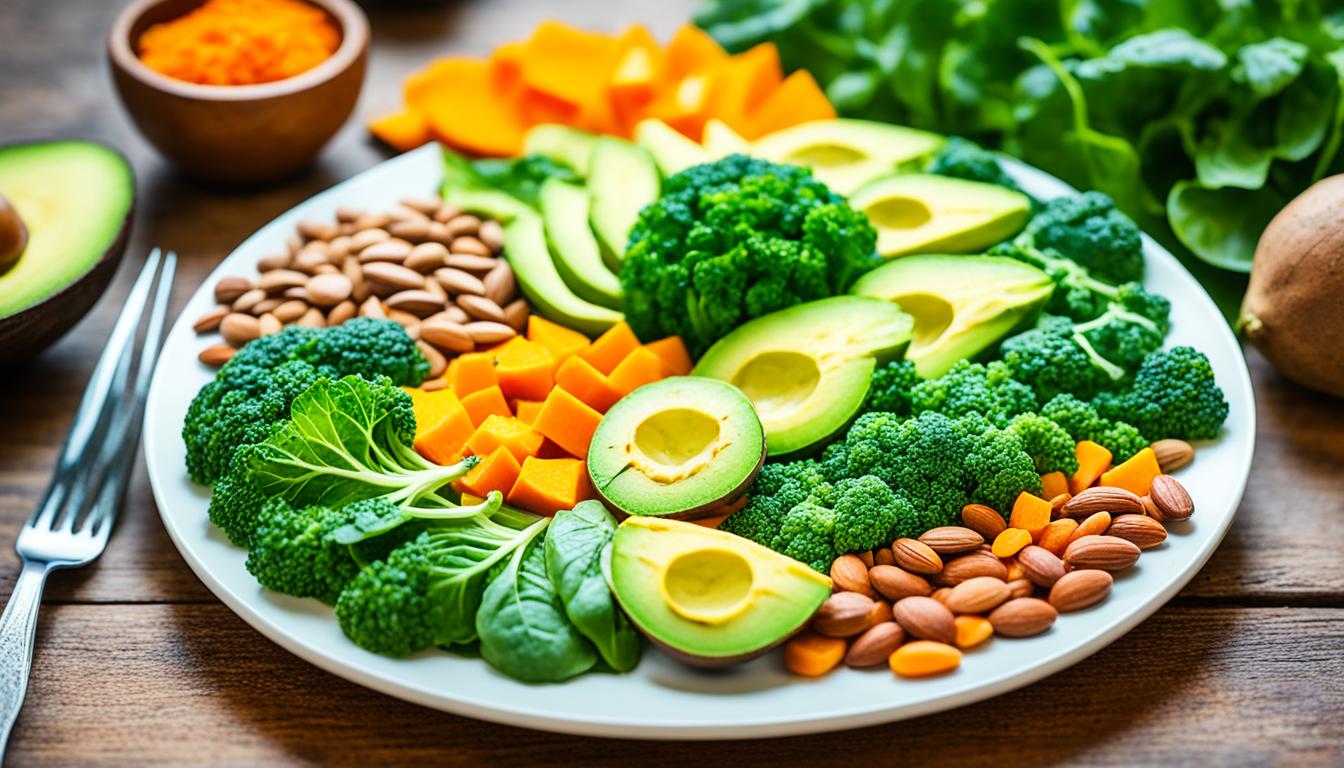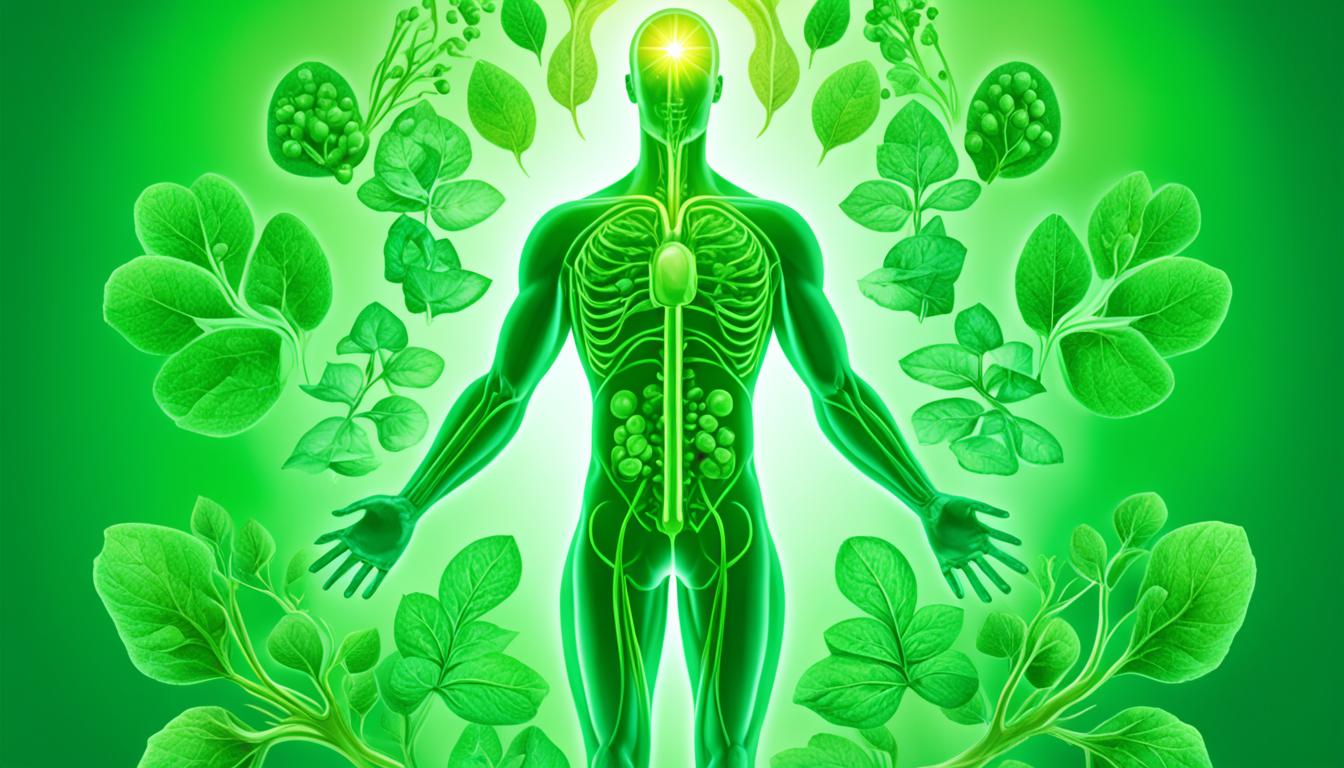Did you know that incorporating vitamin E-rich foods into your diet can have a significant impact on your overall health? Vitamin E is a powerful antioxidant that plays a crucial role in protecting your cells from damage caused by free radicals. It also supports your immune system and promotes healthy skin and eyes.
In this article, we will explore the top foods that are abundant in vitamin E, helping you make informed choices to enhance your well-being. From nutrient-packed nuts and seeds to vitamin-rich fruits and vegetables, we will provide you with a comprehensive list of delicious options to bolster your vitamin E intake.
So, let’s dive in and discover the incredible world of vitamin E-rich foods and how they can contribute to your healthy lifestyle!
Key Takeaways:
- Vitamin E is a powerful antioxidant that protects cells from damage.
- Including vitamin E-rich foods in your diet supports the immune system and promotes healthy skin and eyes.
- Our article will provide a comprehensive list of top foods rich in vitamin E.
- Discover nutrient-packed nuts and seeds, vitamin-rich fruits and vegetables, and more!
- Enhance your well-being by incorporating these delicious vitamin E-rich options into your meals.
The Importance of Vitamin E in a Healthy Diet
Vitamin E is a crucial nutrient that plays a vital role in maintaining overall health and well-being. It is an essential part of a healthy diet, offering numerous benefits to the body.
Understanding the Role of Antioxidants
Antioxidants are compounds that help protect the body against damage caused by free radicals. Vitamin E is a powerful antioxidant that helps neutralize these harmful free radicals, reducing the risk of oxidative stress and chronic diseases.
By neutralizing free radicals, vitamin E helps prevent cellular damage and inflammation. It contributes to maintaining healthy skin, cardiovascular health, and immunity.
Recommended Daily Intake of Vitamin E
The recommended daily intake of vitamin E varies depending on age, sex, and life stage. For adults, the recommended daily allowance (RDA) of vitamin E is 15 milligrams (or 22.4 international units) per day.
It is important to note that certain conditions such as pregnancy, breastfeeding, and certain medical conditions may require higher vitamin E intake. It is best to consult a healthcare professional to determine the appropriate intake for individual needs.
Health Benefits of Adequate Vitamin E Levels
Adequate levels of vitamin E offer a wide range of health benefits. Some of the key benefits include:
- Protecting against chronic diseases: Vitamin E’s antioxidant properties help reduce the risk of chronic diseases such as heart disease, cancer, and neurodegenerative disorders.
- Promoting skin health: Vitamin E helps maintain healthy skin by protecting it from oxidative damage, promoting wound healing, and reducing UV damage.
- Boosting immune system: Vitamin E plays a crucial role in supporting the immune system, enhancing its ability to fight off infections and diseases.
- Supporting eye health: Vitamin E may help protect against age-related macular degeneration (AMD) and cataracts by reducing oxidative stress in the eyes.
- Improving brain health: Some studies suggest that vitamin E may have a positive impact on brain health, reducing the risk of cognitive decline and improving memory and overall cognitive function.
Ensuring an adequate intake of vitamin E through a balanced diet is essential for reaping these health benefits. Incorporating vitamin E-rich foods into daily meals is a great way to meet the recommended daily intake and support overall health and wellness.
Foods Rich in Vitamin E
Vitamin E is an essential nutrient that plays a crucial role in maintaining overall health. Including foods that are rich in vitamin E in your diet can provide numerous benefits for your well-being. Fortunately, there are various food sources that are high in vitamin E to choose from. Let’s explore some of the top foods that can help you meet your daily vitamin E needs:
Nuts:
- Almonds – 1 ounce contains 7.3 milligrams of vitamin E
- Hazelnuts – 1 ounce contains 4.3 milligrams of vitamin E
- Peanuts – 1 ounce contains 2.2 milligrams of vitamin E
Seeds:
- Sunflower seeds – 1 ounce contains 9.3 milligrams of vitamin E
- Pumpkin seeds – 1 ounce contains 4.3 milligrams of vitamin E
- Flaxseeds – 1 ounce contains 1 milligram of vitamin E
Fruits:
- Mango – 1 cup contains 2.3 milligrams of vitamin E
- Kiwi – 1 cup contains 1.1 milligrams of vitamin E
- Avocado – 1 medium avocado contains 2.7 milligrams of vitamin E
Vegetables:
- Spinach – 1 cup contains 3.7 milligrams of vitamin E
- Broccoli – 1 cup contains 1.2 milligrams of vitamin E
- Swiss chard – 1 cup contains 2.2 milligrams of vitamin E
Cooking Oils:
- Wheat germ oil – 1 tablespoon contains 20.3 milligrams of vitamin E
- Sunflower oil – 1 tablespoon contains 5.6 milligrams of vitamin E
- Olive oil – 1 tablespoon contains 1.9 milligrams of vitamin E
By incorporating these vitamin E-rich foods into your diet, you can ensure that you’re getting an adequate amount of this essential nutrient. Remember to consult with a healthcare professional or nutritionist to determine the appropriate amount of vitamin E for your specific dietary needs.

Top Seed and Nut Sources of Vitamin E
Seeds and nuts are excellent sources of vitamin E, offering a range of nutritional benefits to support a healthy lifestyle. In this section, we will explore some of the top seed and nut sources of vitamin E, including almonds, sunflower seeds, and brazil nuts. These nutrient-rich foods can be easily incorporated into your diet to help increase your intake of this essential vitamin.
Almonds and Their Nutritional Profile
Almonds are not only a delicious and versatile snack but also pack a punch when it comes to vitamin E content. These tree nuts are a great choice for individuals looking to boost their vitamin E intake. Just one ounce of almonds provides approximately 7.3 milligrams of vitamin E, delivering over a third of the recommended daily intake for adults.
Furthermore, almonds offer a well-rounded nutritional profile, containing fiber, healthy fats, protein, and other essential vitamins and minerals. They are also a rich source of antioxidants, which help protect the body against oxidative stress and free radicals.
To incorporate almonds into your diet, enjoy them as a standalone snack, sprinkle them over salads or yogurt, or use almond butter as a delicious alternative to spreads.
The Underappreciated Sunflower Seed
Sunflower seeds often take a backseat to other nuts and seeds, but they deserve recognition for their vitamin E content. Just one ounce of sunflower seeds can provide approximately 7.4 milligrams of vitamin E, making them a powerful source of this essential nutrient.
In addition to vitamin E, sunflower seeds offer a range of other health benefits. They are packed with healthy fats, fiber, and various minerals. Sunflower seeds are also an excellent source of zinc, which plays a crucial role in immune function and overall health.
Enjoy sunflower seeds as a convenient and nutritious on-the-go snack, sprinkle them over salads or cereals, or incorporate them into homemade granola bars or energy balls for added crunch and flavor.
Brazil Nuts as a Selenium Powerhouse
While brazil nuts are known for their selenium content, they are also a good source of vitamin E. Just one ounce of brazil nuts contains approximately 6.2 milligrams of vitamin E, contributing to your daily intake of this essential nutrient.
In addition to vitamin E, brazil nuts offer an abundance of selenium. Selenium is a trace mineral that works synergistically with vitamin E to help protect cells from oxidative damage and support the immune system.
It’s important to note that brazil nuts are highly nutritious but should be consumed in moderation due to their high selenium content. Just two to three brazil nuts per day are enough to provide the recommended daily intake of selenium for most individuals.
Include brazil nuts as a part of your nut mix, sprinkle them over salads or roasted vegetables, or enjoy them as a standalone snack for a nutrient boost.
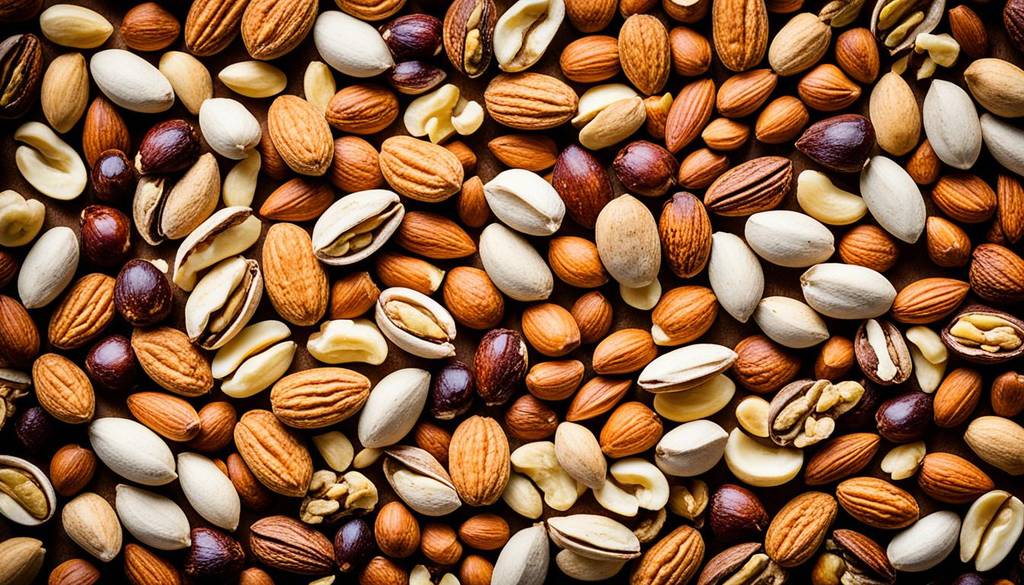
Seeds such as sunflower seeds and nuts like almonds and brazil nuts are not only tasty but also provide significant amounts of vitamin E. Incorporating these nutrient-rich foods into your diet can help ensure you meet your daily vitamin E requirements and enjoy the associated health benefits.
An Exploration of Vitamin E Rich Fruits and Vegetables
When it comes to incorporating vitamin E into your diet, fruits and vegetables are excellent sources. Not only do they provide this essential nutrient, but they also offer additional nutritional benefits. Let’s take a closer look at some of the vitamin E-rich fruits and vegetables you can include in your meals:
Vitamin E Rich Fruits:
- Mangoes: These tropical fruits are not only delicious but also packed with vitamin E.
- Avocado: Known for its healthy fats, avocados also contain significant amounts of vitamin E.
- Kiwi: Apart from being a great source of vitamin C, kiwi also contains vitamin E.
- Papaya: This tropical fruit is not only rich in vitamin C but also contains vitamin E.
- Blackberries: These antioxidant-rich berries are also a good source of vitamin E.
Vitamin E Rich Vegetables:
- Spinach: This leafy green vegetable is not only high in iron but also contains vitamin E.
- Broccoli: Known for its numerous health benefits, broccoli is also a great source of vitamin E.
- Sweet Potato: Apart from being rich in fiber, sweet potatoes also provide vitamin E.
- Red Bell Peppers: These colorful vegetables are not only packed with vitamin C but also contain vitamin E.
- Asparagus: This nutritious vegetable is low in calories and contains vitamin E.
By incorporating these vitamin E-rich fruits and vegetables into your diet, you can ensure you’re getting the necessary nutrients for a healthy lifestyle. Including a variety of colorful fruits and vegetables in your meals can provide a range of vitamins, minerals, and antioxidants that are beneficial for overall wellness.
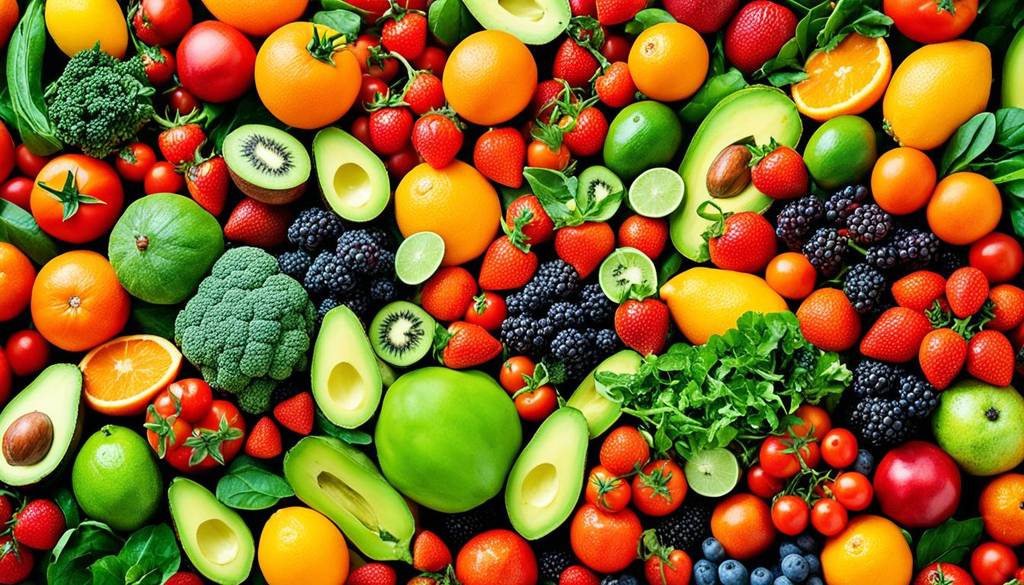
Cooking Oils: A Concentrated Source of Vitamin E
Cooking oils play a significant role in adding flavor and texture to our favorite dishes. However, did you know that certain cooking oils are also high in vitamin E? Incorporating these oils into your cooking can be an excellent way to boost your vitamin E intake and enjoy the health benefits associated with this essential nutrient.
Wheat Germ Oil—the Vitamin E Champion
When it comes to cooking oils high in vitamin E, wheat germ oil takes the spotlight. It is incredibly rich in vitamin E content, making it an ideal choice for those looking to increase their vitamin E intake. Just one tablespoon of wheat germ oil can provide a substantial amount of vitamin E, contributing to the recommended daily intake.
Aside from its high vitamin E content, wheat germ oil also offers other nutritional benefits. It is a good source of omega-3 and omega-6 fatty acids, antioxidants, and various minerals. Incorporating this versatile oil into your cooking can not only elevate the nutritional profile of your meals but also add a unique nutty flavor.
Uncommon Yet Potent: Hazelnut and Almond Oils
While not as commonly used as other cooking oils, both hazelnut oil and almond oil deserve a place in your kitchen. These oils not only provide a burst of flavor but also contain significant amounts of vitamin E.
Hazelnut oil, derived from roasted hazelnuts, boasts a high vitamin E content that contributes to its antioxidant properties. It adds a robust, nutty flavor to salads, desserts, and even savory dishes. Similarly, almond oil, extracted from almonds, offers a considerable amount of vitamin E, providing a unique and delicate flavor to various recipes.
When choosing cooking oils, consider adding wheat germ oil, hazelnut oil, or almond oil to your repertoire. These oils not only enhance the taste of your dishes but also provide valuable amounts of vitamin E, supporting your overall health and well-being.
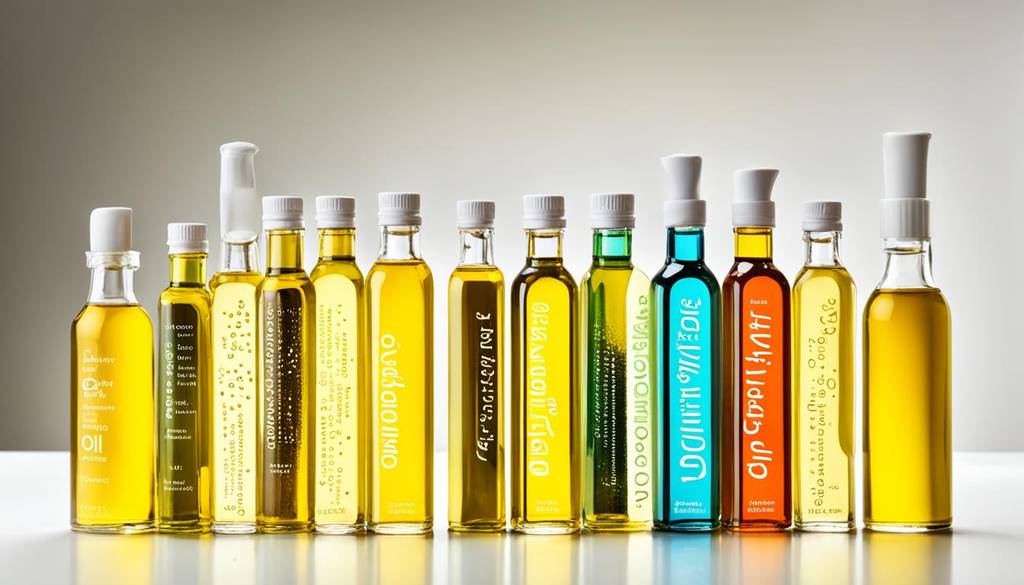
Conclusion
Incorporating vitamin E-rich foods into a healthy diet is crucial for optimal wellness. By incorporating a variety of foods that are high in vitamin E, individuals can reap a host of health benefits and support overall well-being.
Vitamin E, known for its antioxidant properties, plays a vital role in protecting the body’s cells from damage caused by harmful free radicals. By neutralizing these free radicals, vitamin E helps reduce the risk of chronic diseases, such as heart disease and cancer.
Additionally, vitamin E supports a healthy immune system, which is essential for fighting off infections and maintaining good health. It also promotes skin health, helping to keep the skin moisturized and protected from environmental damage.
To incorporate vitamin E-rich foods into your daily meals, consider incorporating nuts and seeds like almonds, sunflower seeds, and brazil nuts. These foods not only provide a good dose of vitamin E but also offer additional nutritional benefits. Fruits and vegetables such as spinach, avocados, and mangoes are also excellent sources of vitamin E.
In conclusion, by including a variety of vitamin E-rich foods in your diet, you can enhance your overall health and well-being. So, make it a point to choose foods that are not only delicious but also provide the essential vitamin E your body needs for optimal function and longevity.
FAQ
What are some foods rich in vitamin E?
Why is vitamin E important for a healthy diet?
What is the recommended daily intake of vitamin E?
What are the health benefits of maintaining adequate levels of vitamin E?
How much vitamin E do almonds contain?
What is the vitamin E content of sunflower seeds?
What additional benefits do brazil nuts provide due to their selenium content?
Which fruits are high in vitamin E?
Which vegetables are rich sources of vitamin E?
How much vitamin E does wheat germ oil contain?
What are some cooking oils that are high in vitamin E?
Source Links
- https://www.hsph.harvard.edu/nutritionsource/vitamin-e/
- https://www.webmd.com/diet/foods-high-in-vitamin-e
- https://www.healthline.com/nutrition/foods-high-in-vitamin-e

